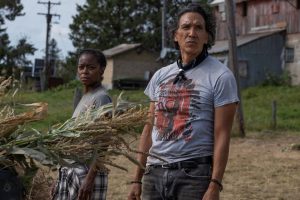Reviews include 40 Acres, Jurassic World: Rebirth, and Sorry, Baby.
TFCA Friday: Week of July 11
July 11, 2025

Welcome to the TFCA weekly, a round-up of reviews and coverage by members of the Toronto Film Critics Association.
In Release this Week
Antidote (dir. James Jones)
“The journalistic side of Antidote isn’t anything documentary viewers likely haven’t seen before in terms of form and structure, but Jones’ ability to stay close to Grozev during such a trying time is revelatory and immediate,” says Andrew Parker at The Gate. “The danger faced is in the moment, not something being reflected upon with hindsight. Antidote hits upon a raw nerve with its look at the dangers faced by journalists who dare to poke the Russian bear.”
“The challenge with Jones’ film is its lack of narrative clarity, bouncing back and forth between these various stories in half measures at best,” writes Jason Gorber at POV Magazine. “The central drama of Grozev’s falling-apart family has moments that are deeply engaging, but save for a fairly saccharine on-camera interview with his son, we only hear snippets of the familial turmoil over speaker phone. Similarly, the deeper ideological drives of Kara-Murza are left unexplored, and his wife’s brave face about his duty to return to Russia borders upon propagandistic knowing the fate he likely faces.”
Apocalypse in the Tropics (dir. Petra Costa)
“In an era that feels like a return to Medieval times but with nuclear weapons, when we see corrupt politicians freely borrowing the language of ancient religious texts to justify violence, extremism has become numbingly familiar,” notes Liam Lacey at Original Cin. “It is to Costa’s credit that she provides a soothing, reflective tone to the subject, both in her poetic voiceover and a hypnotically smooth editing that movies from drone shots of crowds, congregations, rallies, and protest marches to handheld closeups of politicians clawing their ways through teeming throngs of admirers.”
“Apocalypse in the Tropics is a chilling look at the religious assimilation of all things political; a world where the divide between church and state no longer exists. And it’s not only happening in Brazil,” writes Andrew Parker at The Gate.
” With the savage clarity that defined her Academy Award–nominated The Edge of Democracy, Costa documents a time of kaleidoscopic confusion and fear with intimate observational filmmaking that braids together the personal, the historic and the mythic,” says Dave Voigt at In the Seats. “As faith shifts from private refuge to public battleground, Brazil holds a mirror to a world where democracies are being tested by the power of prophecy.”
“The parallels between the Brazilian mob of January 8 and the American insurrectionists of January 6, 2021 are clear. And yet without ever needing to utter the expletive ‘Trump’ in her thoughtful voiceover, Costa’s layered essay situates her nation’s political unrest within a larger global crisis,” writes Pat Mullen at POV Magazine. “The difference here is that Apocalypse in the Tropics observes an eye of the storm. As the final title cards note, Bolsonaro faces accountability for inciting the mob. Trump’s re-election offers fodder for other documentaries, but Costa finds prophetic grandeur in Brazil’s defense of its civil structure. It’s a clarion call to preserve our democratic rights.”
Bang (dir. Wych Kaosayananda)
On In the Seats with…, Dave Voigt chats with star Peter Weller about his career in genre films, from Buckaroo Bonzai to RoboCop to Bang.
“The kills are brutal and frequent, sometimes inventive, and often shocking. If there’s a meaning to Bang, it’s that cruelty makes for good cinema—so long as you don’t stop to think about it. Which is exactly what the film doesn’t want you to do,” says Thom Ernst at Original Cin. “Is it good? No. But is it watchable? Absolutely. But please, do not categorize this as ‘so bad it’s good’—that implies ironic enjoyment. Bang operates in its own category: so bad, it’s almost watchable. And in the crowded deluge of disposable entertainment, that’s almost a compliment.”
Brick (dir. Philip Koch)
“The reviews of Brick have been mixed, but given the premise, the film succeeds in generating sufficient mystery with some thrills, while also injecting emotion, often absent in such films, by the introduction of the protagonist couple with relationship problems,” says Gilbert Seah at Afro Toronto. “The film is also well paced with sufficient surprises around every corner.”
Madea’s Destination Wedding (dir. Tyler Perry)
“This is Perry’s comedy nonsense, which usually gets bad reviews from critics, though the film is quite funny – Tyler Perry has a superb sense of humour,” admits Gilbert Seah at Afro Toronto.
Pavements (dir. Alex Ross Perry)
“Pavements blows music film cliché to smithereens,” writes Pat Mullen at POV Magazine, who speaks with Alex Ross Perry about crafting a Pavement film in a singular voice: “The admirable goal should be and must be a bespoke film about our chosen subject that could only exist for them,” says Perry. “You could make this exact movie about any band. You could take any band and make a movie that has put their songs in a musical, cast actors to play them, smash it all together in the edit. For most bands, you’d look at it and go, ‘Why the hell was this the approach for this movie? What does this have to do with this band?’ Whereas for us, what we were hoping for was people going, ‘Wow, this is the most perfect approach for this band. They really found that.’”
Portraits of Dangerous Women (dir. Pascal Bergamin)
“Richly drawn supporting characters give real body to this wonderful film,” writes Anne Brodie at What She Said. “Odds of the fateful accident seem low but we buy it because the story’s carefully constructed, an engaging film that embraces life’s ironies, chances and nuances. The performances are lifelike, the writing and direction spot on.”
Push (dir. David Charbonier and Justin Powell)
“All the elements that make a good narrative and picture are missing,” says Gilbert Seah at Afro Toronto. “There is no character development, no plot twists, no story in fact, no audience anticipation or any humour of any kind. The film is made up of isolated scary set-pieces, many of which are not connected or the story. The raison d’être for the killer is also absent.”
“At heart, Push is a home invasion/haunted house hybrid, stitched together with scraps from more interesting films — Inside, Barbarian, and, for those willing to throw their horror memories back a few decades, some foggy remnants of 1980s’ Hammer productions,” notes Thom Ernst at Original Cin. “The kind where women in flowing nightgowns carry candelabras and explore catacombs with no more urgency than they would if they were making their way to the kitchen for a late-night snack.”
Simple Plan: The Kids in the Band (dir. Didier Charette)
“It’s not a rock and roll or punk rock story really with that many warts on it because….let’s face it they are Canadian; but Simple Plan: The Kids In The Crowd is a testament to the ideals that every aspiring musician or artist needs to hold on to,” says Dave Voigt at In the Seats. “If you want to have a hope in hell of making it, you simply can’t give up, a message so important and so easily forgotten in an era where people are clawing for fame and success at every turn. To be honest, this film actually show that Simple Plan as a band is probably more Sinatra then punk or rock. They did it their way, because it’s the only way they knew how.”
Sovereign (dir. Christian Swegal)
“Offerman and Tremblay are exceptional in roles that require them to play against type,” says Joe Lipsett at Murder Made Fiction.
Superman (dir. James Gunn)
At The Globe and Mail, Johanna Schneller profiles Canuck co-star Nathan Fillion, who plays Guy Gardner. “James [Gunn]’s storytelling style and sense of humour really suit me,” Fillion tells Schneller. “He loves his job, and I know whenever I work with him I’m going to laugh. Only your very best friends can roast you really hard. With James I look forward to it: ‘How hard is he going to roast me today?’ … Being snarky and clever is great, but it’s not as rewarding as when someone says something true about themselves. A confession that’s embarrassing but true is funny to us.”
“It’s too busy, and too full of characters who arrive with little backstory and minimal explanation,” observes Chris Knight at the National Post. “The filmmakers also make some questionable story choices, including a frame-up for Superman that’s the silliest thing since The Muppets’ Fozzie Bear got his head stuck in a painting. Also, I don’t want to reveal the identity of the final boss battle, but it struck me as one of filmdom’s hoarier clichés. Oh, and if I never hear the term ‘pocket universe’ again it’ll be too soon.”
“What Gunn is not so great at is storytelling. Superman is all over the place, not just geographically – zipping from the icebound Arctic to the skyscrapers of Metropolis to the corn and wheat fields of Kansas – but also narratively. Gunn packs so many heroes, villains, creatures and incidents into his screenplay, it’s as if he’s presenting a preview of future DC Universe delights. That is, in fact, largely what he’s doing. He seems to have forgotten that popcorn munchers want to see the story now, not tomorrow,” says Peter Howell at the Toronto Star. “The real star of the show, however, is Krypto, a snowy-furred mutt that rescues Superman (as seen in the trailer) and upstages him every time the two share the frame. I’d rather see a film about superdog Krypto than yet another one about Superman.”
“The character of Superman is an appealingly sincere one with strong values. Sure, he was born on Krypton, but he’s more of a classic Kansas farm boy. Superman really believes in old fashioned and cliché-admirable Americana virtues. In a confusing, divisive age, it’s a beautiful thing. Gunn walks the line by having him affirm these virtues at a point late enough in the movie where it seems like a bad idea to throw in so much sincerity,” writes Karen Gordon at Original Cin. “Superman is a bit of a mixed bag. It succeeds at modernizing the characters, but the storyline is often just silly.”
“The onerously saccharine image of brown faces holding pitchforks and ratty flags bearing superman’s logo also threatens to sink the entire movie into the realm of self-parody; as superheroes swoop in to the valiantly save the day, Superman starts to read more like the vainglorious movie-within-the-show of superhero satire The Boys: an-in universe film expressly intended to mock how insipid and offensively shallow superhero franchises tend to be,” says Jackson Weaver at CBC. “But seeing them play out in modern-day live-action shows how woefully misguided it is to view that as the all-encompassing guidepost for success. Things that work in comics do not always land in other mediums. Slavishly throwing them in might satisfy an internet argument, but often leads to tone-deaf results.”
“James Gunn has crafted a film that pleasingly has something for everybody,” adds Andrew Parker at The Gate. “If you want an earnest depiction of Krypton’s greatest surviving son in all his inherent goodness, Gunn has viewers covered. If you want a self-reflexive take on a genre that has gotten stale as of late, Superman has you covered, too. If you don’t like the character of Superman because he’s indestructible and not all that vulnerable, Gunn has more than a few surprises up his sleeve. If all you want is a dumb and silly summer blockbuster that blows a lot of things up and gives some good natured chuckles along the way, look over here. And if you want a movie that can distract from the awful nature of this world at the moment in a meaningful way, dang it, Superman obliges. Sure, being all things to all people can make Gunn’s film somewhat of a chaotic, overstuffed mess at times, but if there’s one character that can handle that burden, it’s Superman.”
To a Land Unknown (dir. Mahdi Fleifel)
“The experiences and choices made in To a Land Unknown are uncomfortable to bear witness to, but Fleifel begs the viewer to never look away; to fully sit with the weight of responsibility and rootlessness that has been saddled upon its characters, who grow increasingly desperate the more pressure is placed upon them,” notes Andrew Parker at The Gate.
“What unfolds is a series of escalating and increasingly risky and debased scams masterminded by Chatila (in a finely tuned performance by Bakri), who keeps us torn between empathy for his desperation and revulsion at his abuse of other people,” says Liam Lacey at Original Cin. “To a Land Unknown is unquestionably topical. It’s also rooted in a well-known movie tradition, films that are empathetic portraits of low-level urban criminals struggling for survival and dignity.”
“Fleifel captures this timely story with urgent resolve. Shot with starkly poetic images, To a Land Unknown recalls staples of new wave American independent cinema of the 1960s’ and ’70s, as well as works like La Haine that gave world cinema a jolt in the 1990s,” says Pat Mullen at That Shelf. “This film offers for today what Kassovitz’s film did then—but Fleifel’s kitchen sink realism serves a stirring reminder that this story is no mere fable. It’s a drama rooted in the experiences of countless stories that get lost amid shots in the dark for a better life elsewhere.”
We Are Guardians (dir. Edivan Guajajara, Chelsea Greene, Rob Grobman)
“It’s unbearable watching the majestic trees fall, knocking down others in its path, and erasing wildlife habitats and its unique species,” notes Anne Brodie at What She Said. “Brazilians understand the situation better now and Bolsonaro was replaced by environmental advocate President Luiz Inácio Lula da Silva. All hail the women who turned the tables on Big Money and fought the system and highlighted global anti-indigenous bias. Still there is more to do. Wow.”
“We Are Guardians is haunting, a potent reminder of how some have no choice but to fight the good fight despite the odds,” writes Barbara Goslawski at POV Magazine. “It is ultimately a call to action and a plea to the global community to join in. This doc not only explores the ongoing threat to Indigenous ways of life but also successfully highlights how the deforestation within Brazil has already affected the worldwide climate crisis. To the film’s credit, there’s nothing didactic here: the filmmakers display a loving, caring approach that invites others to pay attention and join in the struggle.”
Ziam (dir. Kulp Kaljareuk)
“The special effects are good, the action fight scenes passable and the make-up and gore are all right for a zombie film,” notes Gilbert Seah at Afro Toronto. “Despite the efforts put in by the filmmakers, there is hardly anything fresh in this film that has not been seen in other action or zombie films. Every subplot has a clichéd end as well. Though the film moves fast, many will still feel the tedium of a film trapped in a well-worn genre.”
TV Talk/Series Stuff
At What She Said, Anne Brodie binges Netflix’s Too Much: “The vibe is funny, modern, and exciting, powered by her personality; she’ll do anything at any time, to express herself. We feel protective but highly entertained. This is a good one.” Brodie also investigates Maggie Q’s Ballard: “An intriguing character study, wrapped in a conspiracy thriller and a showcase for Maggie Q, as a wild card, a woman who talks back.” And Operation: Aunties offers another feminist option: “Lots of Dark Web, assumed identities and action, but the heart of the series is the friendship between the three, and the ways they are able to put strategies in place to keep women safe.” Meanwhile, The Real Project X continues Netflix’s Trainwreck series: “a cautionary tale and once again shows the power of film.”



